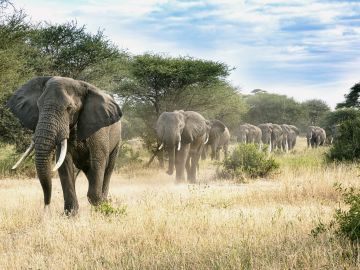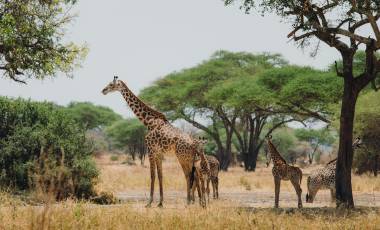It was an absolutely amazing trip. We saw the Big 5 plus their babies. We also saw the Ugly 5. Plus thousands of zebras and wildebeests and hundreds of different gazelles.

Tanzania Wildlife Safaris
Our Best Tanzania Safari Tours
Top 5 Animals to See on Tanzania Safari Tours
1. The African Elephant:
One of the most majestic and awe-inspiring creatures you can encounter on a Tanzania safari is the African elephant. These gentle giants roam the savannah in large herds, often seen socialising, grazing or bathing at watering holes. Observing elephants’ fascinating social dynamics and playful antics is an unforgettable experience.
2. The Lion:
Known as the “King of the Jungle,” the lion is another iconic species that attracts travellers from around the world to Tanzania. The country’s vast grasslands provide the perfect hunting grounds for these apex predators, giving you the opportunity to witness their raw power and stealth in action. Whether lounging under a tree or stalking their prey, watching lions in the wild is a thrilling experience that lets you appreciate their strength, grace and social behaviour in their prides.
3. The Giraffe:
On Tanzania safari holidays, you’ll get to meet the world’s tallest mammal, the giraffe, which gracefully roams the acacia-studded landscapes of the national parks. With their long necks and elegant gait, giraffes are a captivating sight as they browse for leaves high in the trees or interact with each other in gentle displays of affection. The opportunity to witness these gentle giants moving through the savannah, silhouetted against the African sunset, is a vision you won’t forget.
4. The Wildebeest:
No Tanzania safari is complete without encountering the sturdy wildebeest, particularly during the Great Migration in the Serengeti. Each year, millions of wildebeest, along with zebras and other herbivores, embark on a perilous journey across the savannah in search of greener lands. The sight of huge herds thundering across the plains in a cloud of dust, braving crocodile-infested rivers and predatory big cats, is a testament to nature’s unrelenting life cycle.
5. The Cheetah:
Last but not least, the cheetah is a highlight of any Tanzania safari, renowned for its speed and agility as the fastest land animal on Earth. These sleek and solitary predators can often be seen prowling the savannah in search of prey, using their remarkable hunting skills to pursue and capture swift-footed targets. Witnessing a cheetah in full sprint or relaxing in the shade after a successful hunt is a rare and thrilling sight.
Peggy Rybachuk Kenya & Tanzania Adventure
Andrew Griffin Kenya & Tanzania AdventureThe 14 day experience was truly amazing for me and my son. The whole experience including the organisation, camping and hotels was outstanding. The trip involved some long days, long drives and early morning but you soon forgot about this as you were rewarded with amazing sunrises, stunning wildlife in at least five different national parks or wildlife area and beautiful scenery. Our local guides and Exodus team were extremely friendly, professional and knowledgeable.
The final few days in Zanzibar allowed us to chill out on a beautiful white beach and enjoy the Indian Ocean. The optional trips including the Serengeti Balloon Experience, the snorkelling in Zanzibar and the Maasia people tour were brilliant.
When is the best time to go on a Tanzania safari?
The best time to go on Tanzania safari holidays is during the dry season, which is between June to October. This is when the wildlife is more concentrated around water sources, making it easier to spot animals in their natural habitat. The shoulder months of May and November can also be good times to visit, as the vegetation is lush and green, and there are fewer crowds.
What types of animals can I expect to see on a Tanzania safari
Tanzania is home to diverse species of wildlife, making it a paradise for animal lovers and conservationists. The country’s rich biodiversity plays host to the Big Five, including the lion, leopard, elephant, buffalo and rhinoceros. Throughout the game reserves you’ll also have the opportunity to spot giraffes, wildebeest, zebras and hippos, among many others. The country is also renowned for its abundant birdlife, with over a staggering 1,000 different species of birds.
FAQs on Tanzania Safari Tours
Tanzania is renowned for its vast and diverse parks and reserves, with spectacular landscapes and abundant wildlife. The Serengeti National Park is famous for the annual wildebeest migration, a breathtaking natural phenomenon that beckons wildlife lovers from around the globe. Other must-visit destinations include the Ngorongoro Crater, a UNESCO World Heritage Site brimming with wildlife, and the stunning Tarangire National Park home to a large elephant population. Tanzania’s conservation efforts have led to the protection of rare species like the black rhino and wild dog.
Tanzania safaris are generally safe when you follow recommended precautions. The country’s national parks and reserves are well-regulated, and game safaris are led by highly experienced guides who prioritise guest safety. However, it’s essential for you to take standard safety measures such as staying aware of your surroundings, following park rules and paying close attention to your guides. While wildlife encounters can be unpredictable, incidents involving tourists are rare. Additionally, travel advisories should be checked before planning a trip, and you should consider purchasing travel insurance.
Most visitors to Tanzania will need a visa to enter the country. Visas can be obtained in advance from the Tanzanian embassy or consulate in your home country, or upon arrival at the airport. It is important to check the visa requirements for your specific nationality before traveling. It’s important to note that visa requirements can quite often change, and you are responsible for ensuring you have obtained the correct visa prior to travelling.
Embarking on an African safari is a once-in-a-lifetime experience that requires ample time to fully immerse yourself in the beauty and wonders of this East African destination. The ideal duration for a Tanzania safari should be at least 7 to 14 days to explore its diverse landscapes and abundant wildlife. This timeframe allows you to explore national parks such as Serengeti, Ngorongoro Crater and Tarangire, as well as the chance to witness the Great Migration, encounter the Big Five and enjoy unique cultural experiences.
Vaccinations aren’t essential when traveling to Tanzania, however, you might want to protect against various diseases such as yellow fever, typhoid, hepatitis A and B and measles, among others. These vaccinations not only safeguard yourself but also help prevent the spread of diseases within the local population. Some vaccinations may be required for entry into Tanzania as per international health regulations. Therefore, it is crucial to consult with a healthcare provider or travel medicine specialist well in advance of your trip to ensure you are fully protected and compliant with vaccination requirements.
The Adventure Begins Here
Get regular inspiration straight to your inbox from Exodus’ experts.





